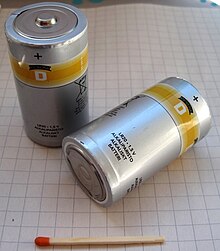D battery

A D battery (D cell or IEC R20) is a standardized size of a dry cell. A D cell is cylindrical with an electrical contact at each end; the positive end has a nub or bump. D cells are typically used in high current drain applications, such as in large flashlights, radio receivers, and transmitters, and other devices that require an extended running time. A D cell may be either rechargeable or non-rechargeable. Its terminal voltage and capacity depend upon its cell chemistry.
The National Carbon Company introduced the first D cell in 1898. Before smaller cells became more common, D cells were widely known as flashlight batteries. The U.S. military designation for this battery has been BA-30 since sometime before World War II.[1] During World War II, it was designated the Type C battery by the U.S. Navy, leading to confusion with the smaller C cell battery (BA-42).
In 2007, D batteries accounted for 8% of alkaline primary battery sales (numerically) in the U.S. In 2008, Swiss purchases of D batteries amounted to 3.4% of primary and 1.4% of secondary (rechargeable) sales.[2][3]

Dimensions and capacity
[edit]D batteries have a nominal diameter of 33.2 ± 1 millimeters (1.3 inches). The overall length is 61.5 millimeters (2.42 inches).[4]
| Zinc–carbon | Alkaline | Li-FeS2 | NiCd | NiMH | Li-SOCl2 | ||
|---|---|---|---|---|---|---|---|
| IEC name | R20 | LR20 | FR20 | KR20 | HR20 | ER? [citation needed] | |
| ANSI/NEDA name | 13D | 13A | 13LF | 13K [citation needed] | 13H [citation needed] | ||
| Typical capacity | milliamphours | 8,000 mAh | 12,000–18,000 mAh | 2,000–5,500 mAh | 2,200–12,000 mAh | 19,000 mAh | |
| energy | 12 Wh | 18–27 Wh | 2.5–6.9 Wh | 2.75–15 Wh | 68.4 Wh [citation needed] | ||
| Nominal voltage | 1.5 V | 1.5 V | 1.5 V | 1.25 V | 1.25 V | 3.6 V | |
| Rechargeable | No | Special type only | No | Yes | Yes | No | |
Names
[edit]Common
[edit]| Name / Type of this battery | Alkaline | Zinc–carbon | Li-FeS2 | Li-SOCl2 | NiCd | NiMH | |
|---|---|---|---|---|---|---|---|
| IEC name | LR20 | R20 | FR20 | ER? [citation needed] | KR20 | HR20 | |
| ANSI/NEDA name | 13A | 13D | 13LF | 13K [citation needed] | 13H [citation needed] | ||
Other
[edit]Battery capacity
[edit]A battery's capacity depends upon its cell chemistry and current draw. Duracell brand rates its alkaline D cell performance as approximately 20,000 mAh at 25 mA draw, but about 10,000 mAh at 500 mA draw.[5] This effect is generally less pronounced in cells with NiMH chemistry and hardly at all with NiCd. Many commonly available size D rechargeable cells are actually sub-C cells in a D-sized holder.
See also
[edit]References
[edit]- ^ "U.S. Army Flashlight".
- ^ Life Cycle Impacts of Alkaline Batteries with a Focus on End-of-Life - EPBA-EU Archived 7 October 2011 at the Wayback Machine
- ^ "Absatzzahlen 2008" (PDF). Archived from the original (PDF) on 25 March 2012. Retrieved 25 March 2012. INOBAT 2008 statistics.
- ^ IEC 60086-2 §7.1.4
- ^ "MN1300 Size: D (LR20) Alkaline-Manganese Dioxide Battery" (PDF). Archived from the original (PDF) on 21 May 2012.
External links
[edit]- Duracell D Size Battery Specification Archived 2020-11-11 at the Wayback Machine
- Energizer D Size Battery Specification for Alkaline Cell
- Brand Neutral Drawing Of NiCd D Battery Based On ANSI Specifications Archived 2017-04-16 at the Wayback Machine
- Brand Neutral Drawing Of NiMH D Battery Based On ANSI Specifications Archived 2017-04-16 at the Wayback Machine
- Brand Neutral Drawing Of Alkaline D Battery Based On ANSI Specifications


 French
French Deutsch
Deutsch